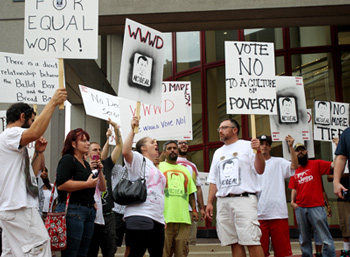
Sept. 27.

Vol. 79/No. 37 October 19, 2015

|
| Toledo Blade/Shelby Kardell |
| Deep hostility to two-tier wages and benefits took auto bosses and union officials by surprise. Above, workers campaign against contract outside union meeting in Toledo, Ohio, Sept. 27. |
Company bosses and UAW officials thought that a $3,000 signing bonus and some pay raises would sell the contract. But they were out of touch with the level of deep hostility to the two-tier deal, especially among younger workers.
“The vote represented our rejection of the tier system of wages,” said Alan Epstein, who has worked at the Toledo Jeep plant since the 1980s, in a phone interview Oct. 3. Production workers there voted 87 percent against the deal. “In 2007 the auto companies cried poverty and the UAW let them set up a two-tier wage system. They’ve hired thousands of workers since then. The Big Three are making big profits now. But the proposed contract sets up many more tiers.”
Presently, new hires start at just over half the pay of workers hired before 2007. The 40-page summary of the defeated contract groups workers hired since then in wage tiers based on how many years they have been employed. They would top out at between $22 to $25.35 an hour, but never reach the $29.76 promised to “legacy” production workers by the end of the contract.
Workers were told in 2007 and 2011 that the second tier would be capped at 25 percent of the workforce, but that was never written into the contract.
“Forty-three percent of the workers at Fiat Chrysler are in the second tier,” said Epstein. “They just don’t buy the proposal. Some of them got together and printed T-shirts with the union logo and a cobra that said ‘Ready to strike.’”
Chrysler, the smallest of the “Big Three” Detroit automakers, was hit hardest by the opening of the capitalist economic crisis in 2008, spiraling into bankruptcy. As part of a government-brokered bailout, the union retiree health trust fund bought 55 percent of the company. The U.S. and Canadian governments bought 10 percent. Fiat got the rest, though it paid no money. Fiat bought out the others, taking complete ownership earlier this year.
Chrysler has increased sales for 44 straight months.
The UAW uses pattern bargaining to negotiate contracts with the Big Three auto companies. Once the first contract is achieved, the idea is that the other two will follow suit.
UAW President Dennis Williams issued a statement Oct. 1 saying the union would notify Fiat Chrysler “that further discussions are needed.”
The vote followed a September UAW organizing victory at the Commercial Vehicle Group in Piedmont, Alabama. The 210 workers there make truck seats. Alan Amos, a welder and 10-year veteran of CVG who helped spearhead the organizing effort, told the New York Times that the breaking point came this spring. “There were conversations around the break room about how things kept getting worse and worse,” Amos said, citing high temperatures inside the plant, worsening benefits and the extensive use of temporary workers who earn $9.70 an hour and have no insurance.
The growing militancy by workers at fast-food outlets, Walmart and others at the low end of the wage scale has boosted the fighting spirit of workers in the auto industry.
“The Fight for $15 shows that some of the lowest-paid workers have decided to put up a fight,” Aradia Clark, a member of UAW Local 551 in the paint shop at Ford’s plant here, told the Militant, adding that she is hopeful about the auto contract fights.
“Opposition to the contract here is across the board,” she said. “The legacy workers have been waiting for a decade to get back what we gave up. And the workers in the second tier, who voted for the contract in 2011 because they thought they would be promoted out of it, don’t have confidence that will happen anymore.
“The profits of the auto companies are being made because of our cheap labor,” Clark said. “If a contract like that is ratified, eventually we’ll have nothing but second, third and fourth tier workers because all the older workers will have retired.”
Labor now accounts for $1,771 of the cost of each vehicle Fiat Chrysler makes in the U.S., according to Sean McAlinden, chief economist at the Center for Automotive Research. That’s down from $4,167 per vehicle in 2007.
In July, Ford posted its largest-ever North American quarterly profit and its best automotive profit since 2000, as net income rose 44 percent in the second quarter.
“The company and the union officers were surprised by the Chrysler vote,” Clark said. “They bank on the ignorance of the young workers and expected them to walk mindlessly into the vote.”